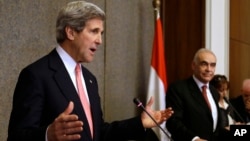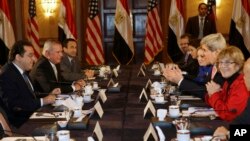CAIRO —
U.S. Secretary of State John Kerry met with Egyptian government officials and some opposition politicians Saturday on his first visit to Cairo as the top U.S. diplomat. The visit to Egypt came during political turmoil in the run-up to controversial parliamentary elections, scheduled to begin in April.
Secretary Kerry told a press conference with Egyptian Foreign Minister Mohamed Kamel Amr that he had come to support the Egyptian people and not to take sides in the country's politics.
“I've tried to make it clear, and I make it particularly clear now on behalf of President Obama and the American people that we come here as friends for the Egyptian people, not for one government or one person or one party or ideology, but for the Egyptian people," he said.
Kerry's visit as the new U.S. secretary of state was criticized by some Egyptian opposition leaders, many of whom accuse Washington of siding with Egypt's ruling Muslim Brotherhood group in the country's ongoing political tug-of-war.
Mohamed ElBaradei, who heads the opposition National Salvation Front, refused to meet with Kerry, as did two other top leaders, Hamdeen Sebahi and Sayed al Badawi. Other opposition figures, including Amr Moussa and Ayman Nour, did speak with the secretary.
Kerry said the United States would support Egyptians as they choose “their own path to follow.” He said the country's economic crisis requires all Egyptians to cooperate.
"We do believe that in this moment of serious economic challenge that it's important for the Egyptian people to come together around the economic choices and to find some common ground in making those choices," he said.
Arab media, quoting the Turkish Anadolu News Agency, reported that Secretary Kerry is trying to broker an agreement between Egypt's rival politicians to form a national unity government. Opposition leaders are demanding that President Morsi form such a government, in exchange for their participation in scheduled elections.
The head of Egypt's electoral commission told journalists Saturday that his office is working to prepare lists of judges and government employees to oversee the vote. He said that an eight-day window will begin next Saturday for candidates to register.
Kerry and Egyptian Foreign Minister Amr said they also discussed regional issues, including the conflict in Syria and the Israeli-Palestinian conflict. Kerry noted that he was holding several meetings with Egyptian Prime Minister Hisham Qandil and that he would speak with President Mohamed Morsi on Sunday.
Kerry's visit came amid scattered unrest in the country, as opposition protesters in Port Said set fire to a police station Saturday after a police vehicle struck several demonstrators. Egyptian media also reported several casualties following clashes in Mansoura overnight.
Veteran Egyptian editor and publisher Hisham Kassem argues that Kerry's visit is not likely to break Egypt's political logjam at a time when Egypt's political crisis is evolving quickly.
“There is nothing specific that he's going to be doing here except the meeting with the secretary general of the Arab League over Syria," he said. "But, most of the visit will be maybe to help him understand the situation that is not a permanent one and is likely to change in several weeks or so.”
Kassem also does not believe the U.S. is supporting the Islamists against the country's secular opposition, despite accusations by some opposition groups.
“There is no indicator that the Americans have supported the Islamists in any way. There is no cash that has been transferred. There is no American satellite that has cast a beam on Egyptians heads and made them vote [for the Islamists]," he said. "What can Americans do on the ground to help the Islamists win an electoral victory? Nothing.”
Kassem accuses the secularists of “making unfounded accusations” and playing “amateurish politics.” He argues that U.S. Ambassador Anne Patterson “was worried as to be perceived to be supporting the [secularists], so she made a lot of effort to stay on good terms with the Islamists.”
Secretary Kerry told a press conference with Egyptian Foreign Minister Mohamed Kamel Amr that he had come to support the Egyptian people and not to take sides in the country's politics.
“I've tried to make it clear, and I make it particularly clear now on behalf of President Obama and the American people that we come here as friends for the Egyptian people, not for one government or one person or one party or ideology, but for the Egyptian people," he said.
Kerry's visit as the new U.S. secretary of state was criticized by some Egyptian opposition leaders, many of whom accuse Washington of siding with Egypt's ruling Muslim Brotherhood group in the country's ongoing political tug-of-war.
Mohamed ElBaradei, who heads the opposition National Salvation Front, refused to meet with Kerry, as did two other top leaders, Hamdeen Sebahi and Sayed al Badawi. Other opposition figures, including Amr Moussa and Ayman Nour, did speak with the secretary.
Kerry said the United States would support Egyptians as they choose “their own path to follow.” He said the country's economic crisis requires all Egyptians to cooperate.
"We do believe that in this moment of serious economic challenge that it's important for the Egyptian people to come together around the economic choices and to find some common ground in making those choices," he said.
Arab media, quoting the Turkish Anadolu News Agency, reported that Secretary Kerry is trying to broker an agreement between Egypt's rival politicians to form a national unity government. Opposition leaders are demanding that President Morsi form such a government, in exchange for their participation in scheduled elections.
The head of Egypt's electoral commission told journalists Saturday that his office is working to prepare lists of judges and government employees to oversee the vote. He said that an eight-day window will begin next Saturday for candidates to register.
Kerry and Egyptian Foreign Minister Amr said they also discussed regional issues, including the conflict in Syria and the Israeli-Palestinian conflict. Kerry noted that he was holding several meetings with Egyptian Prime Minister Hisham Qandil and that he would speak with President Mohamed Morsi on Sunday.
Kerry's visit came amid scattered unrest in the country, as opposition protesters in Port Said set fire to a police station Saturday after a police vehicle struck several demonstrators. Egyptian media also reported several casualties following clashes in Mansoura overnight.
Veteran Egyptian editor and publisher Hisham Kassem argues that Kerry's visit is not likely to break Egypt's political logjam at a time when Egypt's political crisis is evolving quickly.
“There is nothing specific that he's going to be doing here except the meeting with the secretary general of the Arab League over Syria," he said. "But, most of the visit will be maybe to help him understand the situation that is not a permanent one and is likely to change in several weeks or so.”
Kassem also does not believe the U.S. is supporting the Islamists against the country's secular opposition, despite accusations by some opposition groups.
“There is no indicator that the Americans have supported the Islamists in any way. There is no cash that has been transferred. There is no American satellite that has cast a beam on Egyptians heads and made them vote [for the Islamists]," he said. "What can Americans do on the ground to help the Islamists win an electoral victory? Nothing.”
Kassem accuses the secularists of “making unfounded accusations” and playing “amateurish politics.” He argues that U.S. Ambassador Anne Patterson “was worried as to be perceived to be supporting the [secularists], so she made a lot of effort to stay on good terms with the Islamists.”











